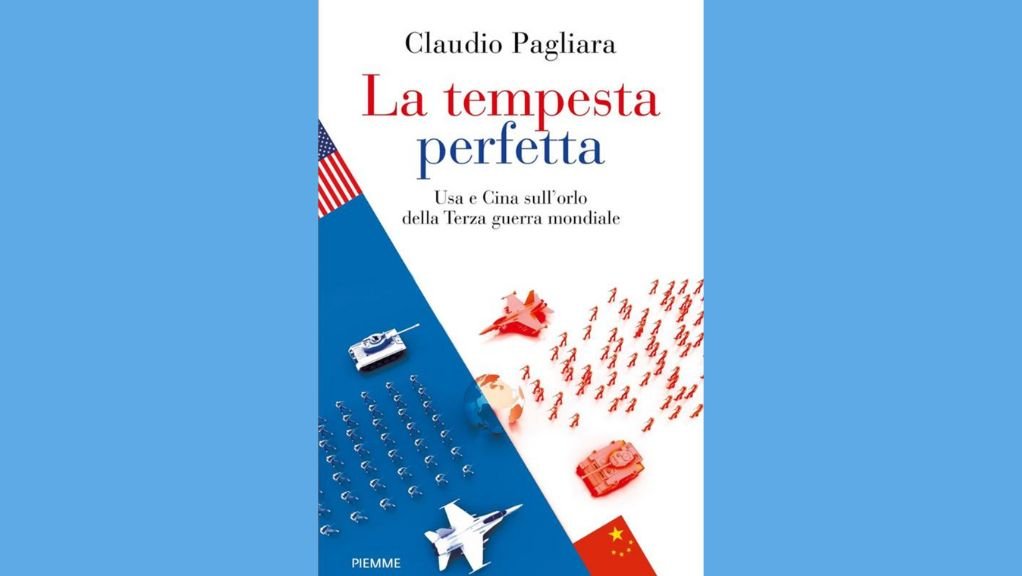As part of the revision of scryptoncittàheld in Cuneo from November 15 to 19, I interviewed Claudio Pagliara, RAI’s head of correspondence for the United States and author of The perfect storm. USA and China on the brink of World War III (Piemme, 2023).
The US has acquired its sphere of influence (some say its informal empire) through sea dominance, military technological primacy, the dollar, but also by being distinguished and valued. Will this ever happen for China?
As we know, the influence that the US acquires in many areas does not depend only onhard power, either by the fact that he freed Europe from Nazism, but also from Hollywood, from culture, from trends, from freedoms. What we say soft power. It is a country where freedom is enshrined in the Constitution and is total, superior to that of Italy. These days, for example, there are openly anti-Semitic demonstrations, which cannot be banned unless an anti-Semitic act is implemented. However, freedom of expression is protected.
Why is China’s soft power still so lacking? However, it perfectly fits certain aspects of their culture. Sun Tzu advised the rulers of his time to “break the enemy’s resistance without fighting.”
China is an authoritarian regime that has never liberated any nation, does not protect freedom of expression, and practices a form of soft power very continuous with hard power. For example, Australia, because it called for an independent investigation into the origins of the pandemic in the time of Covid, saw its lobsters boycotted. For Taiwan, when it moved too far towards independence, it caused a boycott of pineapples, which were mainly exported to China.
We often talk about the internal divisions of democracies, but China is also a collection of eccentric territories: Hong Kong, Tibet, Xinjiang… Do the United States and China share the difficulty of reuniting the nation before the world?
I believe that in authoritarian regimes, by their nature, internal divisions do not arise, but that does not mean that they do not exist. The power struggle is happening, but secretly. If it manifests, it does so in a destructive way, with coups, violent overthrows, assassinations of leaders. Democracies make a lot of noise, I like to call it “the noise of democracy”. They are controversial by nature: all against all, it is very difficult to find agreement, one vote can be decisive and set in motion hundreds of billions in investment. We saw how difficult it was to find a majority in Congress that would allow us to invest in the infrastructure that the US so desperately needs. However, I am deeply convinced that, despite the background noise and the seemingly lower performance, democracy is always the one that wins precisely because of its ability to participate in the debate, to be more inclusive. Empires are in the hands of leaders who can also be very lonely in power…
As the Putin case showed…
That’s right, he made the wrong decision to invade Ukraine on his own. We have seen the price it pays in terms of international isolation. Xi was also alone in the zero-coronavirus policy, which, beyond reason, was extended for an extra year, causing far-reaching damage to the economy, but also psychological damage to the Chinese themselves. It was then forced to lift these restrictions in the wake of mass protests, without even completing the vaccination cycle for the elderly, resulting in a large number of casualties. That decisions are imposed from above is a sign of weakness, not strength.
In Chinese tradition, rulers receive a “mandate from heaven”, which consists of full powers, but must ensure a good harvest for the people. The last few years have not been particularly good…
20% of Youth unemployment is unprecedented for China since Deng Xiaoping’s reforms. Let’s not forget that in 1989, after the bloody suppression of student and labor protests in Tiananmen Square, the Communist regime made a deal with the youth: you give up your freedoms, but in exchange for increased prosperity and a rosy future for you and the your children. Now that pact is falling apart. Confucianism also foresees the end of the “mandate of heaven” as the only instance in which the people could rebel against the ruler: the emperor was tasked with presiding over a series of expiatory rites for the harvest when these no longer proved effective and drought arrived, people took it as a sign from heaven. I don’t know if we are at that point, but the harvests are certainly not good and the regime is now showing some signs of cracking. The Minister of Foreign Affairs and Defense was removed a few months after his appointment. Very strange! This has never happened in China. Premier Li Keqiang died suddenly. For goodness sake, he may have died of a heart attack, but the Chinese regime is so gray and dark that all cases can be opened.
Dealing with China is a bit like dealing with biblical interpretation, with semiotics. We can only interpret the signals…
In a democracy, the removal of ministers would lead to journalistic inquiries, with confrontations by those involved, with the majority and the opposition ready to explain why and wherefore. By whom. In China, the reason for the removal is not even known. We have to read between the lines.
Is Taiwan a prerequisite for Sino-American competition? To use Garibaldi’s language, Taipei or death?
It is written in Xi’s China chromosomes that Taiwan will be reunited with China. Xi has made it clear that this task can no longer be delegated from president to president. He also said that if the issue is not resolved through negotiations, which he would prefer, he is prepared to use force. All the modernization of the People’s Liberation Army in the last ten years leads us to assume that China is preparing for this. If it conquered Taiwan, it would effectively undermine the US and reduce its influence in Asia to a minimum. It would also force Asian allies like Japan and South Korea to fall in line or listen. Many analysts argue that, in China’s plans, the year of annexation could be 2027. Xi would need it to crown the end of his third term and run for a fourth term, but I think that, if the economic crisis creates problems in the regime, times would be shortened. History teaches us that regimes resolve internal difficulties with patriotism.
Do you think China has real allies or just co-interests, devotion to convenience?
Not what we mean by allies. They built the famous Silk Road, they have allies in Africa, BRICS, they have Russia. It is an alliance defined as “no limits”, but it is not the alliance we intend. In this alignment, each has a different goal, but what really holds the “allies” together, especially China and Russia, is the need to weaken the US. Moreover, Russia and China have been at war in the past, they are competing for influence in Central Asia, they are not countries meant to love each other. If I were Putin I would be worried too, he has moved his entire army to the western front, leaving the eastern border exposed! Trusting the Chinese is good, not trusting is better!
Is betting in the United States still a good bet?
I think so. Even if society is divided, politics gone mad, even if the country today is very polarized, even if we are witnessing an electoral contest between two strange candidates, one considered too old, the other saturated with judicial problems, yet the democracy America has shown that it has the antibodies to survive even the most difficult tests, such as January 6, 2021. Finally, the judicial and political system resisted: it is the power of democracy, which is not understood by the regimes. These divisions are seen as weaknesses and instead demonstrate that democracies have the resources to overcome many challenges. Empires are extremely rigid: it doesn’t take much to shatter their granite unity, because it is based not on consent, but on fear.
Can the building site of world freedom depend on the US alone?
No, I think Europe can play a big role as long as it finds a common foreign policy, takes more important steps towards integration, builds a common and stronger economic policy…
In this book, again on the subject of China, he talks about the culture of “face”, the sense of shame. Should the episode of Hu Jintao’s departure from the Congress be interpreted in the light of this cultural fact?
For a Chinese, this “face culture” is very important. If something is not right between a boss and an employee, it should be discussed discreetly, not in front of others. If a reprimand is to be made, this is very important. When you make someone “lose face”, you do it with a very specific intention, to also send a very strong message to other potential allies. The removal of Hu Jintao from the People’s Congress is a clearly unnecessary act: it served to make someone lose face who, perhaps, in secret rooms questioned the overly authoritarian or overly statist tendencies of the Chinese economy.
Did you like this article?
To continue bringing you quality content, MicroMega needs your support: DONATE NOW.

